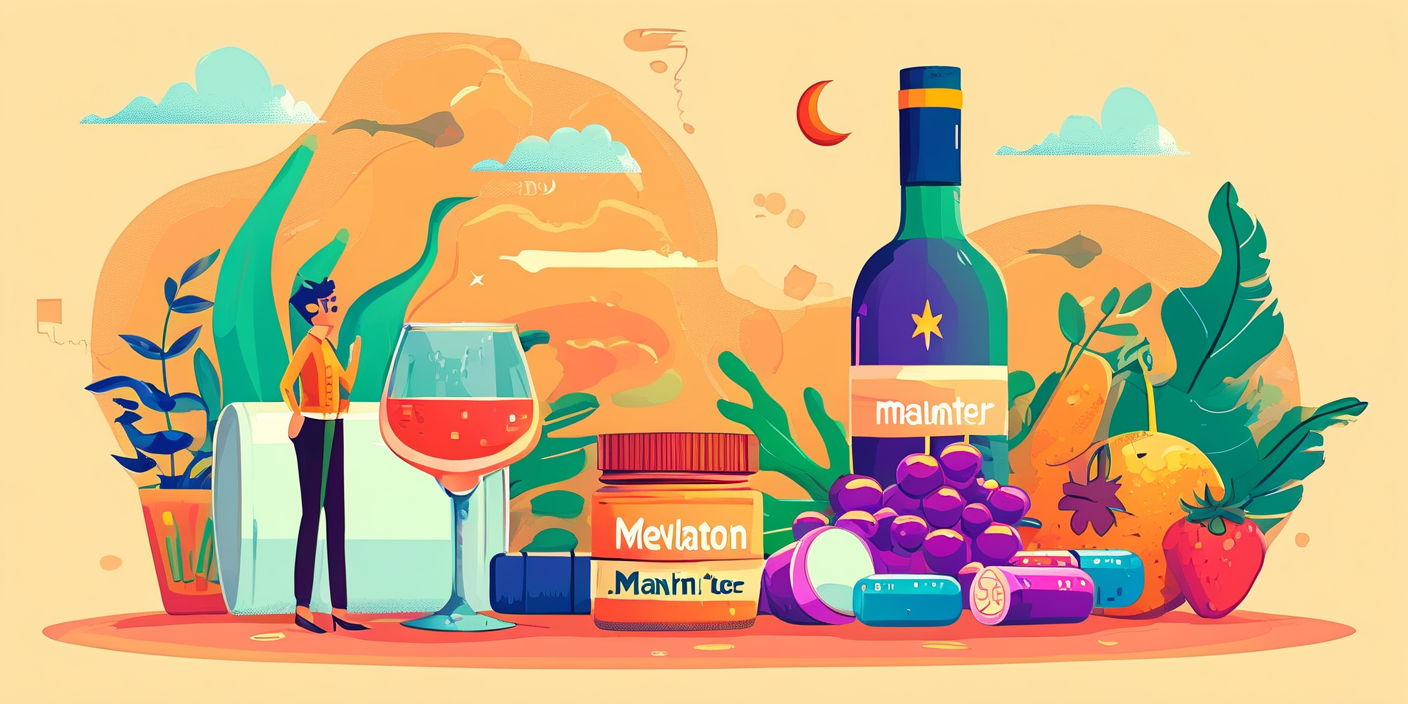Many people rely on melatonin to improve their sleep quality. Others enjoy a glass of wine to unwind before bed. But what happens when you combine the two? The question, “Can I take melatonin after drinking a glass of wine?” is surprisingly complex, and the answer isn’t a simple yes or no. This comprehensive guide explores the interaction between melatonin and alcohol, examining the potential benefits, risks, and safer alternatives for achieving restful sleep.
Understanding Melatonin and its Role in Sleep
Melatonin is a hormone naturally produced by the pineal gland in the brain. It regulates the sleep-wake cycle, also known as the circadian rhythm. As darkness falls, melatonin production increases, signaling to the body that it’s time to sleep. Supplements containing melatonin are widely available and often used to treat insomnia, jet lag, and other sleep disorders. However, it’s crucial to remember that melatonin supplements are not regulated by the FDA in the same way as prescription medications, so quality and dosage can vary.
How Melatonin Works
Melatonin binds to specific receptors in the brain and throughout the body, influencing various physiological processes related to sleep. These receptors play a role in regulating sleep onset, sleep duration, and overall sleep quality. While generally considered safe for short-term use, long-term effects and interactions with other substances require careful consideration.
The Effects of Alcohol on Sleep
Alcohol, while initially relaxing, can significantly disrupt sleep architecture. While it might help you fall asleep faster, it often leads to lighter, less restorative sleep, characterized by frequent awakenings and reduced REM sleep. This fragmented sleep can leave you feeling groggy and unrefreshed in the morning, even if you’ve slept for several hours.
Alcohol’s Impact on Melatonin Production
Alcohol’s influence on sleep extends to its interaction with melatonin. Studies suggest that while alcohol might initially increase melatonin levels, this effect is short-lived and often followed by a suppression of melatonin production later in the night. This fluctuation can further disrupt your natural sleep cycle and lead to poor sleep quality.
Combining Melatonin and Alcohol: Potential Risks and Benefits
Taking melatonin after drinking alcohol presents a complex scenario. The potential benefits are minimal, while the risks are more significant. There’s no evidence to suggest that combining the two will enhance sleep quality. In fact, the opposite is often true.
Potential Risks of Combining Melatonin and Alcohol
- Increased Sedation: The combined sedative effects of alcohol and melatonin can lead to excessive drowsiness, impaired coordination, and even respiratory depression in susceptible individuals.
- Worsened Sleep Quality: While alcohol might initially induce sleep, its disruptive effects on sleep architecture, compounded by the fluctuating melatonin levels, can result in significantly poorer sleep quality.
- Increased Risk of Side Effects: Both alcohol and melatonin can cause side effects, such as headaches, nausea, dizziness, and daytime drowsiness. Combining them may increase the likelihood and severity of these side effects.
- Interactions with Medications: If you are taking other medications, both alcohol and melatonin can interact negatively, potentially leading to unpredictable and harmful consequences. Always consult your doctor before combining supplements or medications.
Minimal Potential Benefits
There are essentially no proven benefits to combining melatonin and alcohol. While some might feel that it helps them fall asleep faster, this initial effect is often offset by the subsequent disruption of sleep quality.
Safer Alternatives for Better Sleep
If you’re struggling with sleep, there are safer and more effective alternatives to combining melatonin and alcohol. These include:
Lifestyle Changes for Improved Sleep Hygiene
- Establish a Regular Sleep Schedule: Go to bed and wake up at the same time each day, even on weekends, to regulate your body’s natural sleep-wake cycle.
- Create a Relaxing Bedtime Routine: Engage in calming activities before bed, such as taking a warm bath, reading a book, or listening to relaxing music.
- Optimize Your Sleep Environment: Ensure your bedroom is dark, quiet, and cool. Consider using blackout curtains, earplugs, or a white noise machine.
- Regular Exercise: Regular physical activity can improve sleep quality, but avoid intense workouts close to bedtime.
- Limit Caffeine and Alcohol Intake: Avoid caffeine and alcohol close to bedtime, as they can interfere with sleep.
- Manage Stress: Practice stress-reducing techniques like meditation, yoga, or deep breathing exercises.
Alternative Sleep Aids (Consult your doctor before using)
- Prescription Sleep Medications: If lifestyle changes are insufficient, your doctor may prescribe sleep medication tailored to your specific needs.
- Herbal Remedies: Certain herbal remedies, such as chamomile tea or valerian root, may have mild sedative effects, but their efficacy varies, and they may interact with other medications.
- Cognitive Behavioral Therapy for Insomnia (CBT-I): CBT-I is a type of therapy that helps identify and change negative thoughts and behaviors that contribute to insomnia.
Dosage Considerations for Melatonin
If you choose to use melatonin, it’s crucial to follow the recommended dosage on the product label. Start with the lowest effective dose and gradually increase it if needed. Overdosing on melatonin can lead to undesirable side effects. Always consult your doctor or a healthcare professional before starting any new supplement, especially if you have pre-existing health conditions or are taking other medications.
Final Thoughts: Prioritizing Sleep Health
While the temptation to combine melatonin and alcohol for better sleep might be understandable, the potential risks significantly outweigh any perceived benefits. Prioritizing healthy sleep hygiene and exploring safer alternatives is crucial for achieving restful and restorative sleep. If you’re struggling with sleep problems, consult your doctor to determine the underlying cause and develop a personalized treatment plan.

